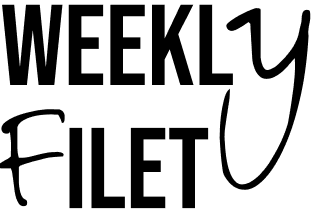44 books curious minds wished they'd discovered sooner
Special books issue, curated by you.
Well hello, dear curious minds and book lovers!
I asked, you answered.
What a joy it has been to work through all the books you submitted and the beautiful, sometimes very personal notes you sent along. I truly hope you enjoy browsing this collection as much as I did compiling it.
46 people have told us about a book they wished they'd discovered sooner in their lives. They are writers, journalists, photographers and YouTubers. Professors of art, religion, history. Gardeners and trail runners. Cooks and web developers. Poets and self-declared overthinkers. Designers and basketmakers. Nonprofit leaders, librarians, climate advocates. Autists, moms, dads. And, my favourite description among them all: a «wickedness and hardship survivor, now paralegal».
And with that, let's dive into this wonderful list of recommendations. If you prefer a plain overview, you can find it on the Weekly Filet Book Club page.
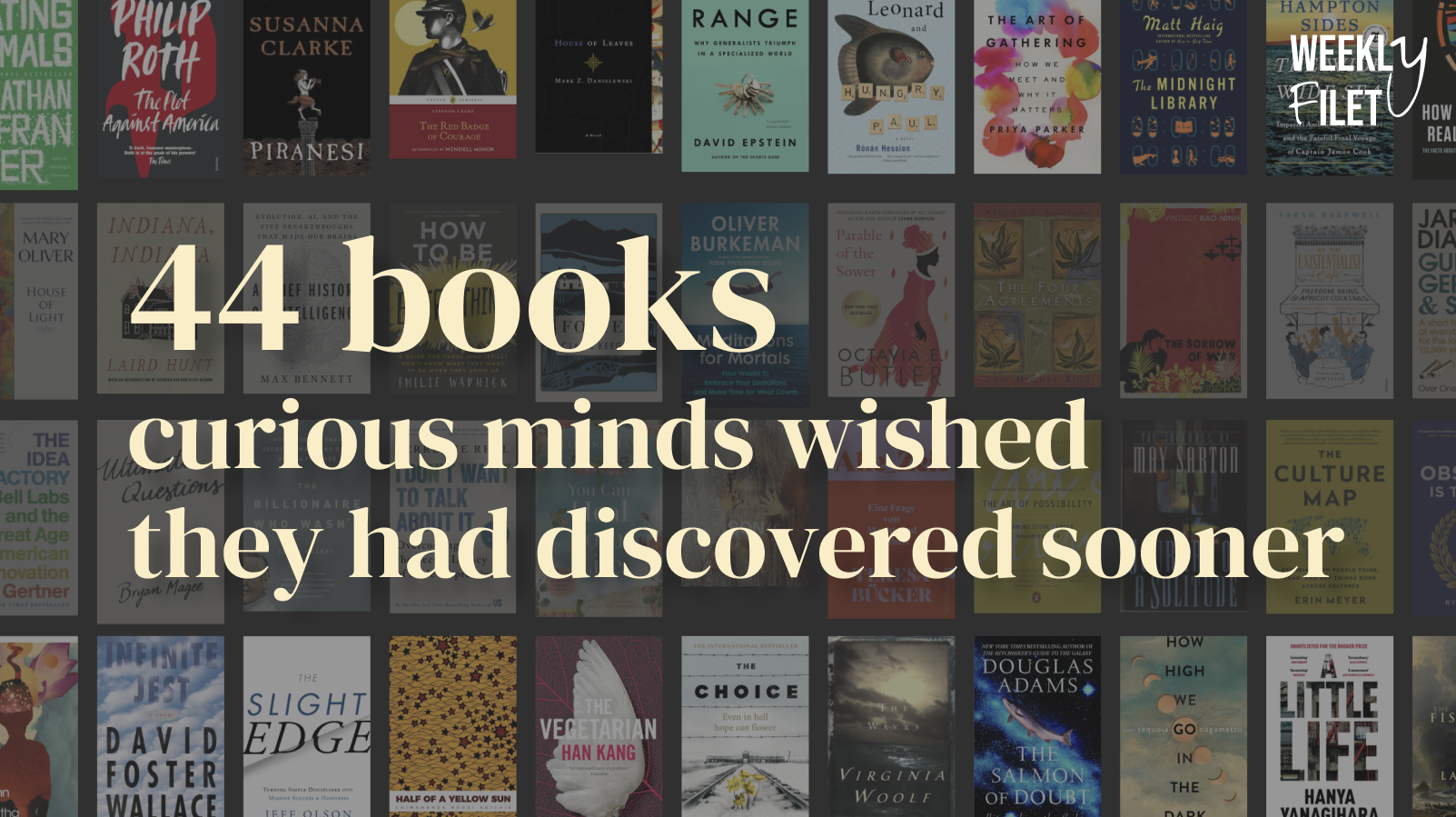

The only two named twice
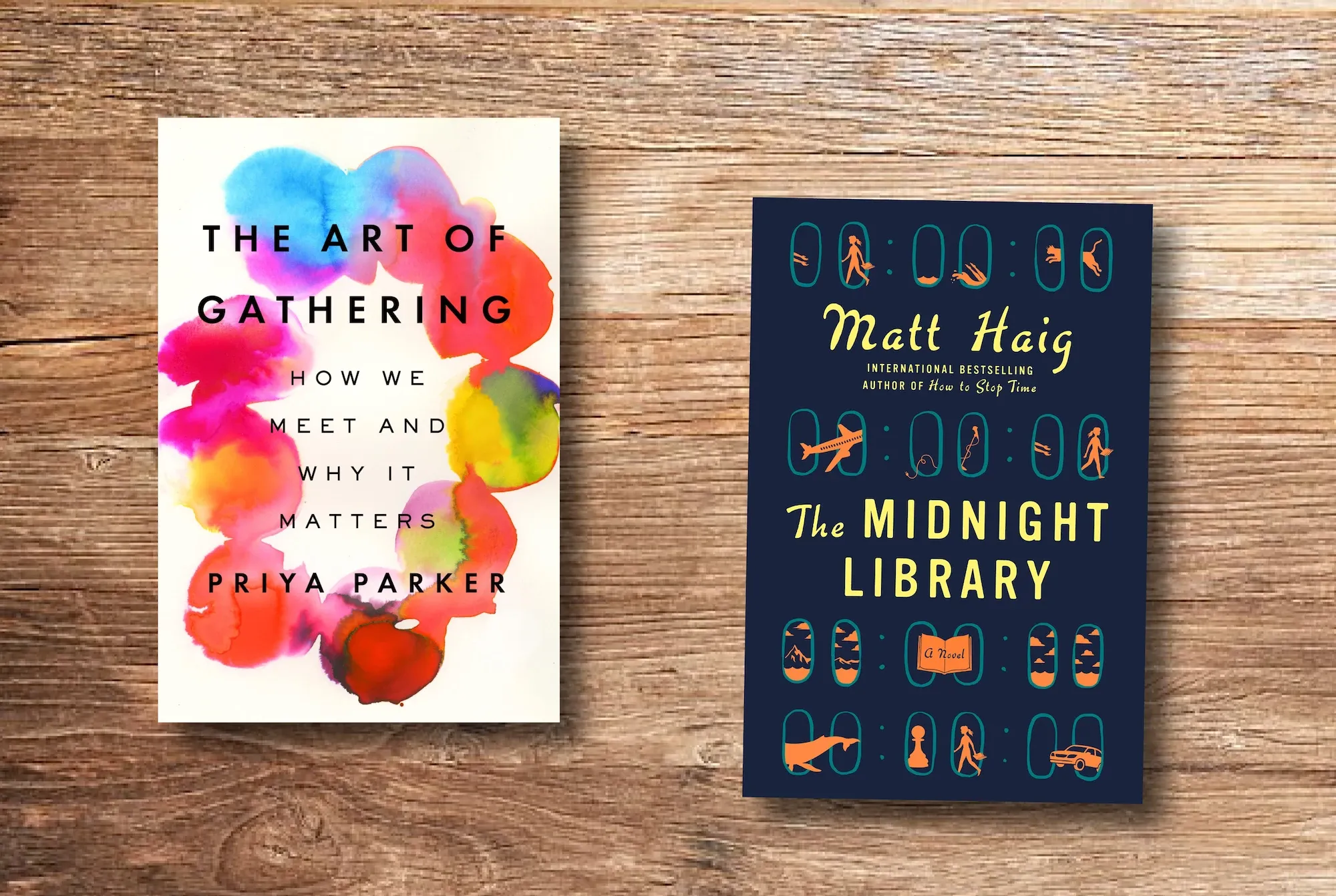
The Art of Gathering, by Priya Parker
«So many of my previous meetings could have been gatherings with real depth and connection.» – Thomas
«Gathering of people happens constantly. In private as well as professional life. It makes sense to know what works well and what not.» – David
The Midnight Library, by Matt Haig
«Shortly after college, when everyone around me was switching jobs, I found this book while on vacation. It had a beautiful and tangible way of illustrating what it means to avoid what-if thinking throughout my life.» – Cameron
«A fantastic read that teaches us that we can have the ability to make the life we want from wherever it is we currently find ourselves. From the highest of highs to the lowest of lows.» – James Molloy
The ones I instantly (re-)added to my own list
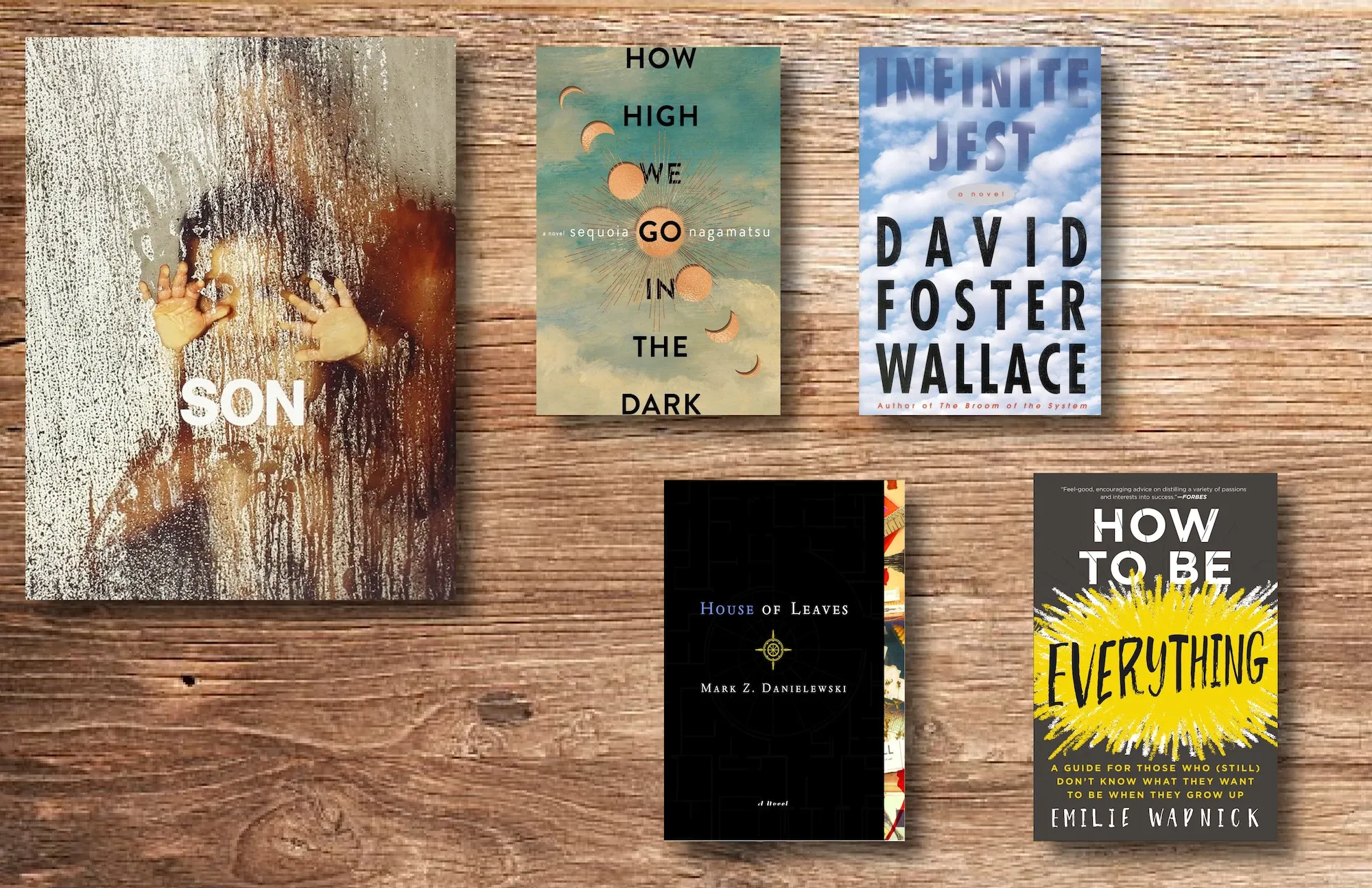
Family Trilogy (Son, Pia, Marion), by Christopher Anderson
«Before I had kids I often found it difficult to imagine what life with children, as a family, could be like. I was afraid it would somehow hold me back from experiencing a full life. Then I found SON, the first of three photo books by former war photographer Christopher Anderson. It contains images of moments with his son, of their life as a family, intimate and raw. This book turned something inside of me. Now I could see myself as a father: as a guide to this big, strange, beautiful world.» — Julian
How High We Go in the Dark, by Sequoia Nagamatsu
«Collection of connected short stories that explore humanity while a pandemic unfolds. Sad and beautiful at the same time.» — TH
How To Be Everything, by Emilie Wapnick
«For most of my life, I've felt like my inability to do "just one thing" was a weakness. This book helped me realise it's a superpower.» — Adam Thomas
House of Leaves, by Mark Danielewski
«It’s a story within a story within a story and more. It’s a literary labyrinth that is made even more interesting and addictive by the typesetting and formatting (which Danielewski did himself). As the mental state of the various characters break down, so do the words. It truly is a singular experience you won’t get anywhere else.» — Luke Goldstein
Infinite Jest, by David Foster Wallace
«If you allow yourself to get involved with this tome, its length and the many footnotes (which must be read) and take the time to do so, this work will reward you like no other. Perhaps the keystone of postmodern literature, this book combines themes such as addiction and loneliness in a way that is both tragic and hilarious.» — David Atwood

High likelihood of «Huh, I never thought of it that way!» moments
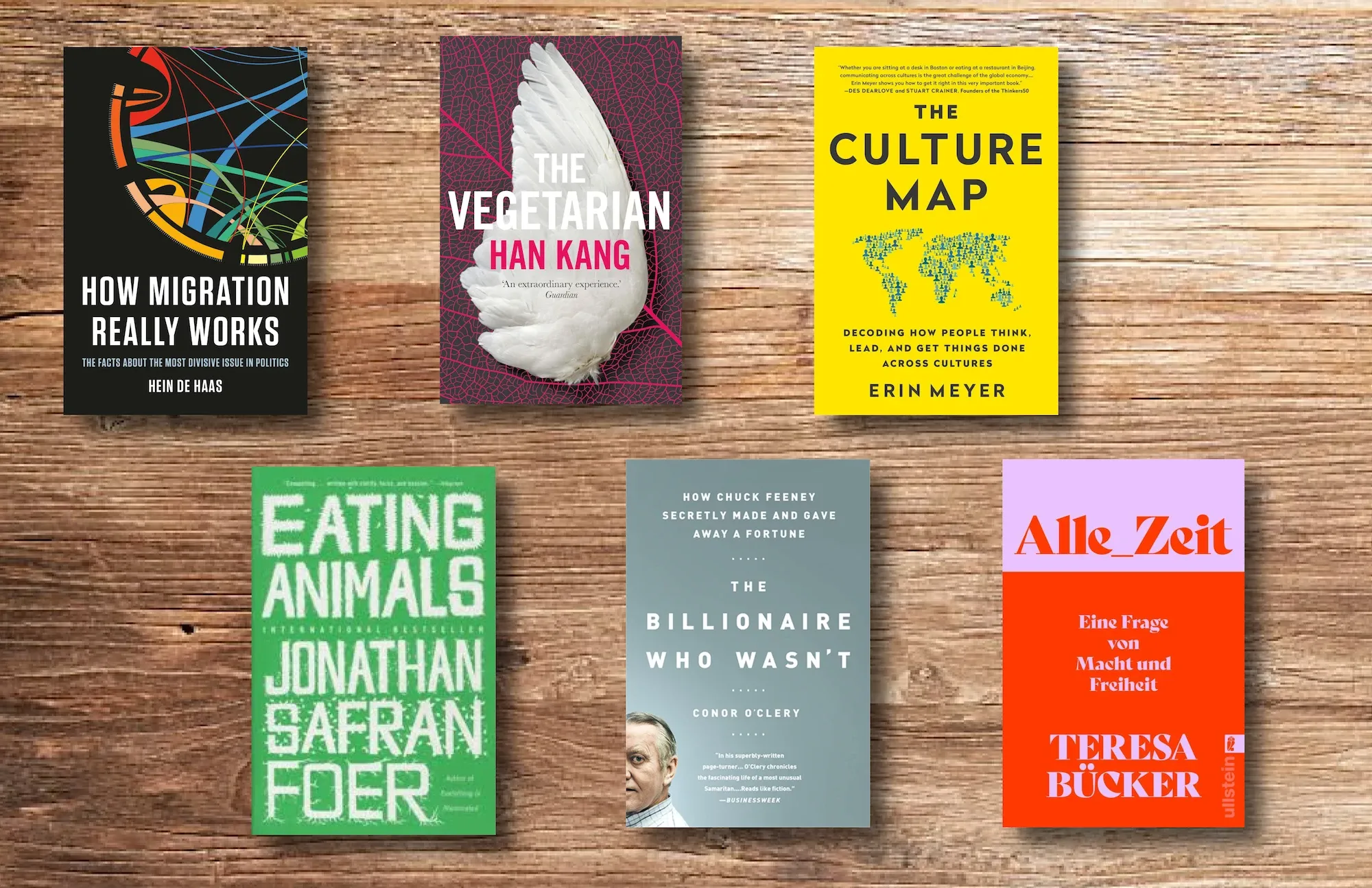
How migration really works, by Hein de Haas
«Everyone has got an opinion, after reading this book you speak with data. Myths of migration discussed one by one. » — Manu
The Vegetarian, by Han Kang
«Reading this book, I was pulled into a vortex of incredibly intense emotions, into a simultaneously dark and poetic story. Han Kang's main character stands strong against a somewhat cruel family and society, completely overwhelmed by her fierce determination.» — Maja
The Culture Map, by Erin Meyer
«Even though I have lived outside of my home country for much of my adult life and always worked in multinational teams, I can still be blindsided by subterranean cultural differences. Such misunderstandings can make you feel like there is something wrong with yourself or your counterpart when they are often just a matter of upbringing. It was only when I read this book that I understood the complexity of potential misunderstandings. Meyer maps the world’s cultures according to how people act in these areas: communicating, evaluating, persuading, leading, deciding, trusting, disagreeing and scheduling.» — Emma Thomasson
Eating Animals, by Jonathan Safran Foer
«I already knew a lot, but when described in such detail, the extent of factory farming becomes much easier to grasp, not only in terms of slaughter but also in terms of manure. I'm not a particularly enthusiastic reader of non-fiction outside of the internet, but I stayed with it despite the sometimes very difficult to digest, drastic content.» — Kixka
The Billionaire Who Wasn't: How Chuck Feeney Secretly Made and Gave Away a Fortune, by Conor O'Clery
«A fantastic story of how Chuck Feeney made billions operating the first duty free shops in Asia and decided one day to give it all away, as a secret donor. He ended up funding the university sector in Ireland and hospitals in Malaysia and kept it secret for years.» — Daryl Feehely
Alle Zeit , by Theresa Bücker
«It is mind-opening that time is more than just a Neutrum. It is a political, social and economic tool that includes dimensions of inequality and dominance. Who benefits that we have no time to think, engage or even protest? Why is time to care for other people not paid aka not worth money? Which other time models are there and why aren’t we there yet? Why do we all never have enough time? It was a very interesting and even entertaining read that changed my working hours and still haunts my thoughts.» — Julia

Meeting this moment in time
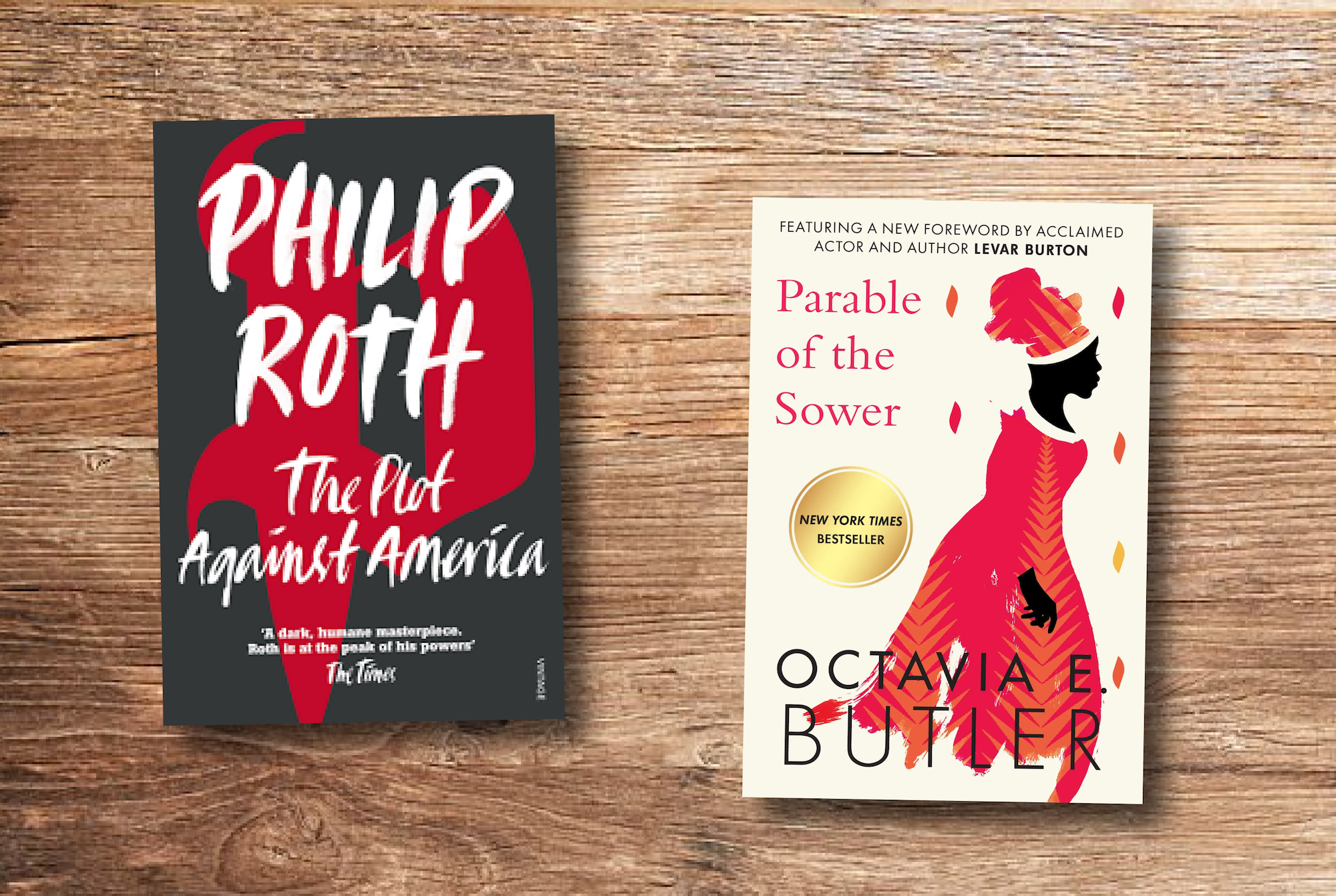
The Plot Against America, by Philip Roth
«What if America had elected a Nazi-friendly president during WWII? The parallels that can be drawn to today are eye-opening. It's one of those books that makes you think that things could improve if everyone would read them.» — Sandra
Parable of the Sower, by Octavia Butler
«It’s eerily realistic, it’s set in 2024, there’s literally a US president with the slogan „Make America great again“ (the book was published in 1993). And yet, it still manages to be hopeful and show how resistance can look like in different forms»

Might unfairly land in the self-help aisle
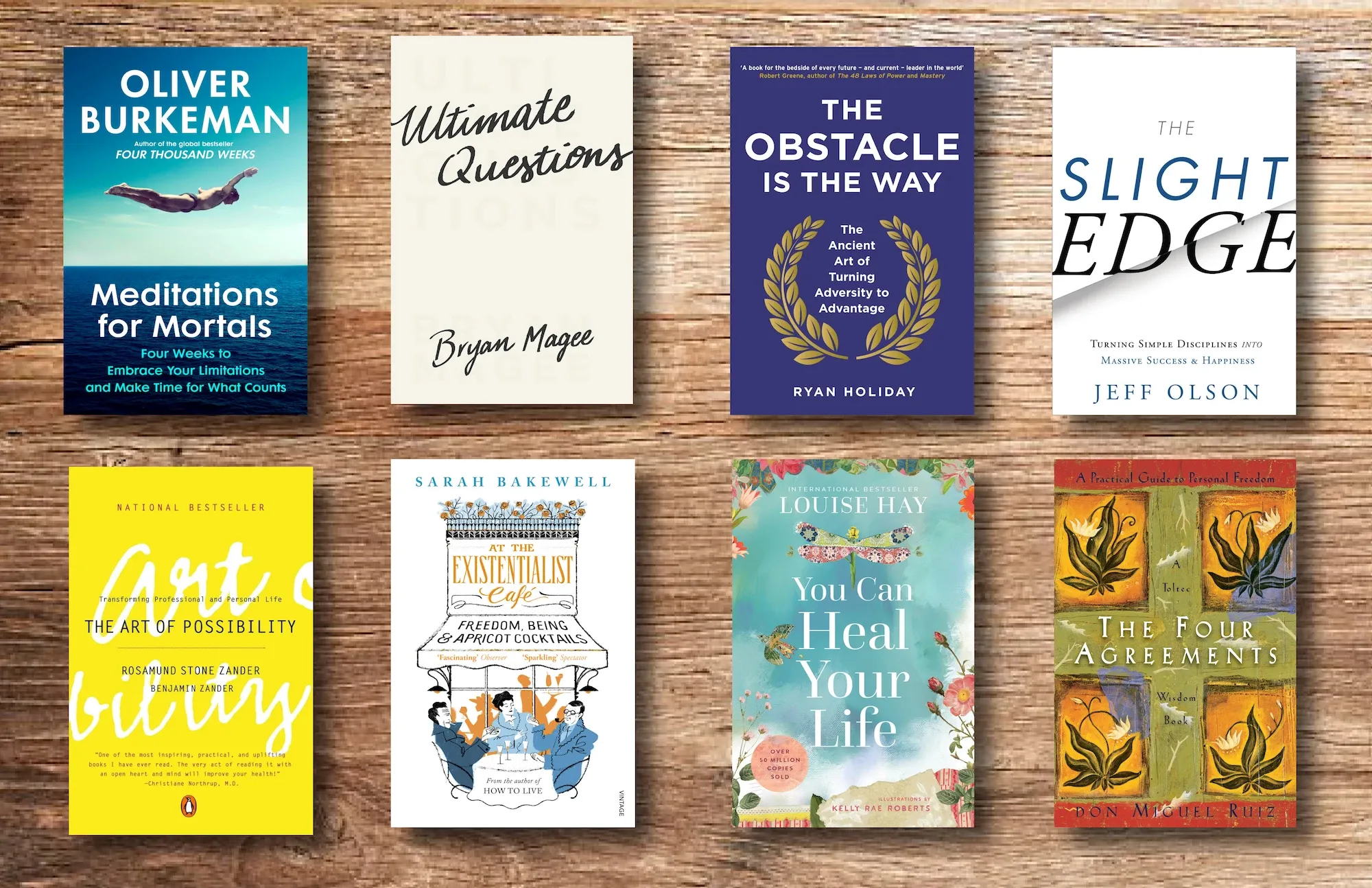
Meditation for Mortals, by Oliver Burkeman
«Everything you already know, but keep forgetting.» — Lou Wilkinson
Ultimate Questions, by Bryan Magee
«Full of and dense with novel ideas, short, beautifully written and the subject remarkably close to my heart.» — Roberto Gejman
The Obstacle is the Way, by Ryan Holiday
«The book I've recommended more than any other. Makes you see life, work, people – everything – in a totally different light. A game-changer for me.» — Justin G
The Slight Edge, by Jeff Olson
«Often when we want to pursue big changes in our lives, we think we need to do big changes in the here and now. In this book, I've learned and applied ever since, that small consistent actions every day move the needle over time. You might not see the results tomorrow, so people dismiss this idea of the slight edge. But I can tell you, I have never discovered another method, as helpful and calm and underrated as this one. In a nutshell, the secret ingredient is straightforward: to do the small things over and over again until success kicks in.» — Burak
The Art of Possibility, by Benjamin Zander and Rosamund Stone Zander
«It changed the way I think about life. There are always other choices, options, possibilities. You just have to think broader. This book talks about ways to do that.» — CRS
At the Existentialist Cafe, by Sarah Bakewell
«It's a great alternative intro to Existentialism, Absurdism, and Nihilism through the lives, relationships, and historical moments of key philosophers and writers. Primary texts can be difficult to read and interpret. But this book introduces key philosophies of the 20th century in the context of war, social justice, and the real, personal lives of Sartre, Simone de Beauvoir, Camus etc.» — Ivana Velickovic
You Can Heal Your Life, by Louise Hay
«Adopting the ideas it sets out is genuinely life-changing and has quickly improved the experience of living for people from all walks of life with whom I have been acquainted.» — Alex Rathbone
The Four Agreements, by Don Miguel Ruiz
«It's a guidebook for how to live your life. It's one I reread or review often. Ruiz shares four principles. Be impeccable with your word. Don't take anything personally. Don't make assumptions. Always do your best. Sounds easy, but it's not. These principles remind me to show up as my best self.» — B. Clauson

Diving into and learning from history
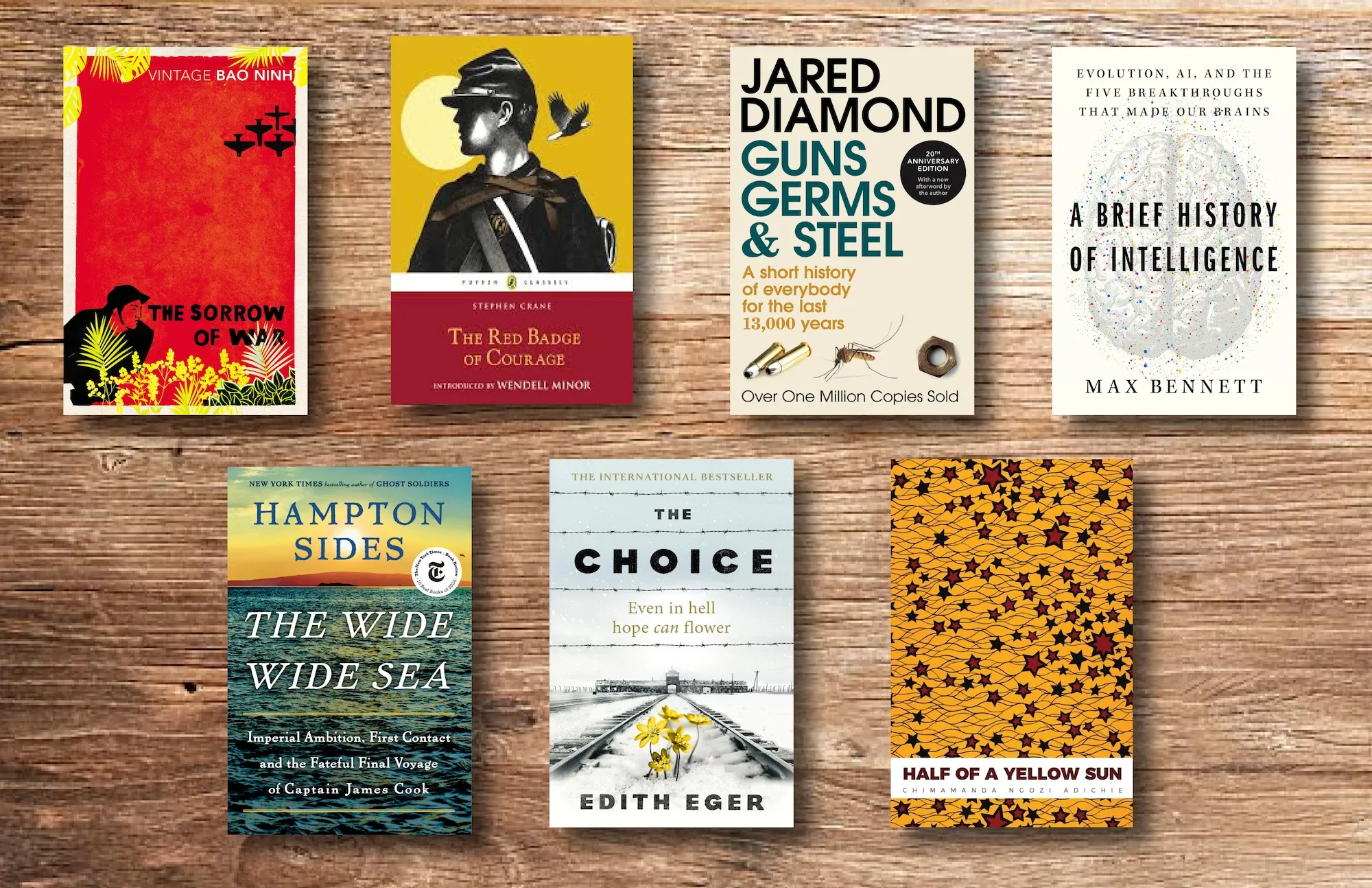
The Sorrow of War, by Bảo Ninh
«The author fought in the Vietnam War on the northern Vietnamese side. He was one of 11 who survived out of a group of 500 soldiers. Although it's fiction, I imagine it's largely autobiographical. What I found amazing is how he writes about a soldier who's trying to become a writer, whilst struggling with flashbacks and PTSD. And the book is written in that style. So when the writer walks home from a bar, smells petroleum, he's catapulted back into the war and so is the reader. The book doesn't follow any chronological order, but it flows seamlessly and as the reader you gradually learn the full truth of what happened to the author during the war. It's very gripping, sad, but also extremely beautiful. I read it when I was in Vietnam and it made me think a lot about the sorrow of war – how civilians and soldiers alike suffer tremendously.» — Thomas
The Red Badge of Courage, by Stephen Crane
«I was brought up on the heroism of war and how it was noble and characters had 'plot armour'. It was an eye opener to see war as it really is, brutal, merciless and unforgiving with the central character experiencing that threat totally.» — Simon
Guns, Germs, and Steel: The Fates of Human Societies, by Jared M. Diamond
«The sweep of human history. Many historians dislike this book as painting in too broad strokes, but it makes sense to me. Diamond has newer works, but this is my favorite!» — Jevan
A Brief History of Intelligence, by Max S. Bennett
«It is a fascinating journey on how human intelligence evolved and the connection with AI Research. An enormous range of concepts in biology, evolution, brain science and AI. It is a joy to read.» — Christine Mouton
The Wide Wide Sea: Imperial Ambition, First Contact and the Fateful Final Voyage of Captain James Cook, by Hampton Sides
«Incredible recreation of Captain James Cook's final journey. Living on an Indonesian Island (Bali) for almost 8 years brings an extra benefit to the story, although Cook's journey takes place in the middle of the Pacific.» — Neill Kramer
The Choice, by Edith Eger
«Edith Eger shares her personal story: She was a teenager during WW2 and lost most of her family while in a concentration camp herself and experiencing unimaginable horrors. After the war, she migrated with her husband and children to the US, where she gradually built a new life. Working through her horrible experiences came later, alongside herself studying psychology and ultimately helping some of the most traumatized veterans. However, it's not her story that is the most inspiring, but how she chose to see things, how she showed up, her resilience, how she always found strength. It inspired and deeply influenced me in a time of personal transformation. I would recommend „The Choice“ because of Edith‘s life story but more so to learn from her beautiful mindset.» — Stephanie Bischof
Half of a Yellow Sun, by Chimamanda Ngozi Adichie
«Day to day life with the Biafran war in the background. Shows how life can run on two tracks. One where something horrible is happening and the other people just living their lives as the war slowly but surely closes in on them. An excellent book about a forgotten horror and about how people survive.» — SCW

The ones that evaded my categorisation efforts
Siddhartha, by Hermann Hesse
«I read this book every 10 years. The first time I was 16 and it felt like a door opened for me. Never was a book so exciting, so mind expanding and had such a profound calling for me. Then I read it in my 20s and I found nuance and beauty that I had missed the first time. The last time round I was in my late 30s and it didn't do anything for me. In fact, I put it aside half way through. It didn't resonate. I am so curious what it will be like when I read it again in a couple of years. This book is not so much about what impact it had on my life but serves as a positioning tool for where my thinking (and state of mind) is at.» — Florian
A Little Life, by Hanya Yanagihara
«It's the most tragic, raw, real, emotional book I've ever read. I have never cried my eyes out so much reading a book.» — Jason Tyler
The Fisherman, by John Langan
«If you've always looked down on the horror genre, this is the book to change your mind. Instead of the usual jump scares and adrenaline, Langan's kindly old man draws you into a meditative yarn on grief and male loneliness, and of course, fishing, before unfolding multiple stories-within-stories (his trademark) featuring scenes of otherworldly terror that take hold and don't let go. It meanders amiably for quite some time before the dread begins to build in layers: America's original sins, superstitions of the old country, the perversion that can occur when powerful men fear a loss of control. This is a horror epic about grief across centuries that resonates because its main contention still stands: men who are unable to process their emotions are capable of wreaking havoc on not just themselves, but society at large. Horror, especially with the kind of engrossing storytelling Langan excels at, gave me a safe distance to contemplate this all-too-everyday reality and a chance to empathize before the catharsis of seeing the deeply flawed characters get what was coming to them. It has awakened a new love for the horror genre, and a search for other authors who write as masterfully as Langan.» — T. Lee
Piranesi, by Susanna Clarke
«I read it in a few hours and dreamt about the world it‘s set in for weeks. It made me prioritize reading novels again. And it inspired many conversations with friends who all read the book on my recommendation. » — Michelle
The Salmon of Doubt, by Douglas Adams
«I've gone back and re-read Hitchhiker's Guide multiple times over the last few decades and even though Adams was one of my favourite writers, I knew so little about him. This book scratched a dozen itches I didn't even know I had. Part memoir, part unfinished stories, part love letter from his closest friends, it is extremely funny and touching.» — Nicholas
Indiana, Indiana, by Laird Hunt
«I love its genealogical structure. I haven't finished it yet, but it already feels like a friend I will visit over and over.» — Nancy
The Waves, by Virginia Woolf
«It is a form I’ve never seen elsewhere, disciplined yet florid poetry in prose, visually and aurally compelling, while besting even Proust at revealing the way in which each of us is simultaneously multiple and unitary. Unforgettable.» — MMcC
Leonard and Hungry Paul, by Rónán Hession
«The regular lives of two friends are told in an exciting and humorous way. It's a story that is both ordinary and poignant.» — MSc
Foster, by Claire Keegan
«A young girl is sent to live with foster parents in the Irish countryside during summer. There she finds kindness that she never had at home.» — SG
The Idea Factory, by Jon Gertner
«I was part of the historic consolidation of the Baby Bells and proudly worked for the Bell System. My passion has always been innovation, and this book was not only inspiring and educational but also a powerful affirmation of what an incredible company I was part of. This book will inspire you – it’s a well-written story of excelling, generating bold ideas, driving innovation, attempting the unprecedented, and embracing deep thinking. Later, I transitioned to IBM before founding my own company. The knowledge and support I gained from Bell System executives were foundational to my success – I wouldn’t be where I am today without those invaluable lessons.» — Ivy Meadors
Journal of a Solitude, by May Sarton
«I have honestly just begun it but it is a powerful poet's reflections amid heartbreak and depression on a life lived in solitude as she pursues her craft of writing. There is a great deal of community in her writing too, but it touches on the deep human condition of feeling alone and is a comfort in times when we might find ourselves in solitude.» — AKC
House of Light, by Mary Oliver
«Poetry is a balm for the soul.» — Kat

The book I wished I had discovered sooner
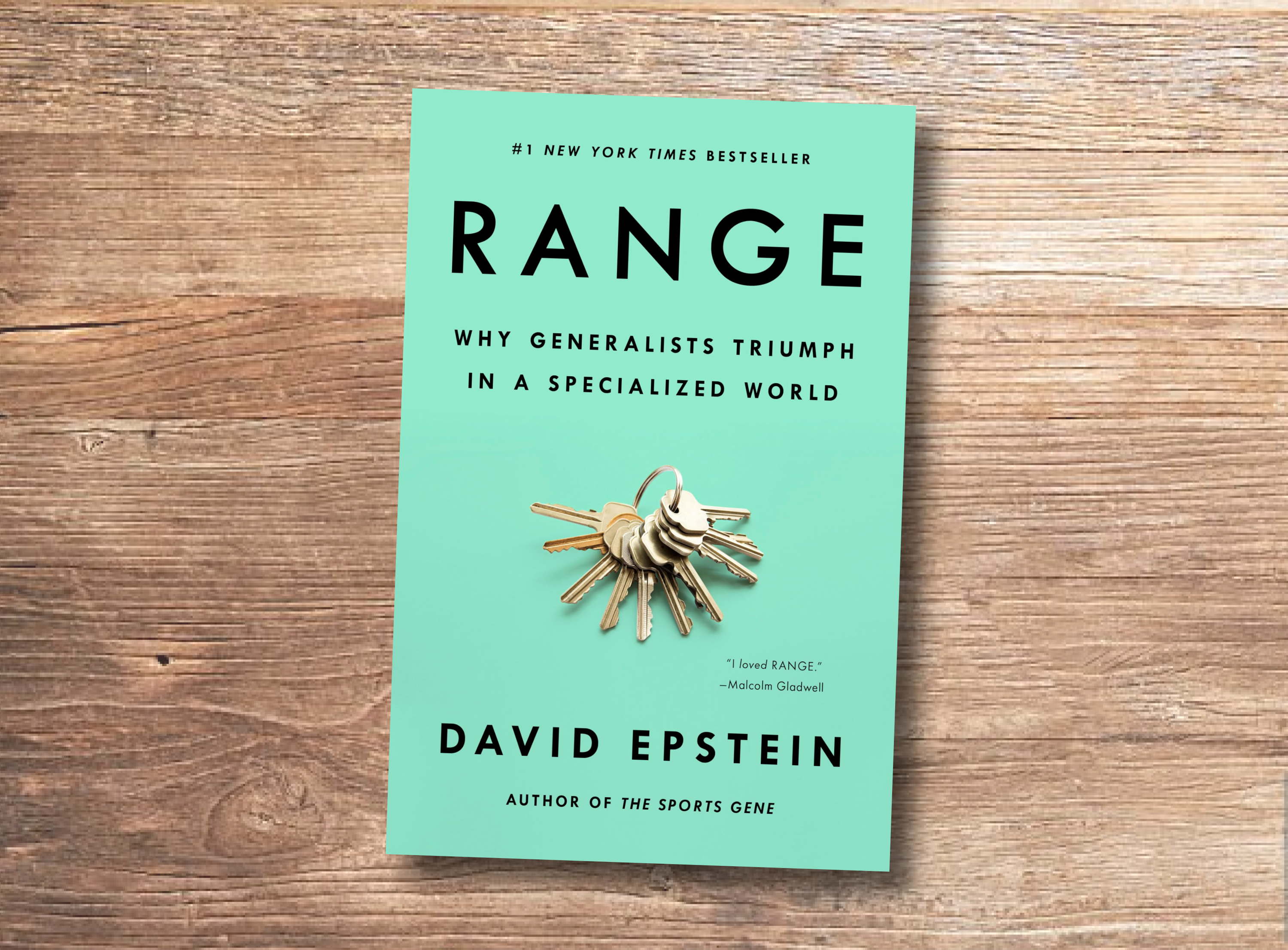
I have always struggled with the fact that I have no one thing that I’m really, really good at. Instead, I know something about a lot of things, I'm good at connecting dots, and I have a broad range of skills that I can combine in ways few others can. That’s great, but it’s sometimes hard to see where exactly to go with that. Epstein’s book has helped me embrace the generalist in me, rather than just accepting it. – David

You've made it. That's the end of the book pile as we know it.
Again, you can find a plain overview of all books here (including from previous years).
Thank you all for contributing to this year's book club. A special thanks to all Weekly Filet members. Without your support, this would not exist. If you appreciate these book recommendations and the weekly newsletter, please consider supporting my work with a membership.
I'll see you next week with a regular issue of the Weekly Filet. Until then: happy reading!
– David
PS: This post is free to read for everyone. Share it far and wide with whoever you think might find it useful.
